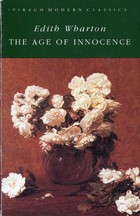Review: ‘The Age of Innocence’ by Edith Wharton
Author: Edith Wharton
Published: Virago, 1994, pp. 303
Genre: Modern classic
Blurb:In the conformist, closed world of upper-class New York, Newland Archer anticipates his marriage to May Welland, a young girl “who knew nothing and expected everything”. Into this ordered arrangement bursts May’s cousin Ellen, the mysterious and exotic Countess Olenska, on the run from an appallingly unhappy marriage. She alternately captivates and outrages the New York milieu and, as Newland’s sympathy for her deepens into love, he not only gains insight into the brutality of society’s treatment of women, but discovers the real anguish of loving outside its rules.
When, where and why: I picked this up about a month ago from my favourite second hand book stall in Winchester because I’ve never read any Wharton before and that seemed like rather an oversight. I was prompted to read it now to fulfill the ‘Read a book from the 1920′s Pulitzer Prize list’ category of my current reading challenge.
What I thought: By the time I had finished the first page of this book I was wondering to myself why on earth I’d never read any Edith Wharton before, and my incredulity only increased the more I read. Everything about this book was fantastic: the story, the characters, the wit, the writing. I don’t usually get quite this effusive about books, but it was love at first sight for me, and I think that The Age of Innocence may be my favourite book so far this year.
The tone of Wharton’s writing reminded me a lot of Jane Austen, although the style is very different; it has the same mix of humour and wry wit accompanying social commentary which somehow manages to be both affectionate and biting. Through this delightful narrative style she reveals the old New York of the 1870′s in all its artificial, innocent, cruel glory, a beautiful, fragile world which is rigidly structured.
The heavy carpets, the watchful servants, the perpetually reminding tick of disciplined clocks, the perpetually renewed stack of cards and invitations on the hall table, the whole chain of tyrannical trifles binding one hour to the next, and each member of the household to all the others, made any less systematised and affluent existence seem unreal and precarious. p. 190
Wharton’s writing makes that world seem real and immediate. The opening chapter in particular is full of asides in brackets explaining everything from what one should wear to which parts of the opera it is acceptable to talk through which feel as though the author is talking behind her hand to you and have the effect of plunging the reader right into the world of New York society. Wharton has a way of using unusual, unexpected words to perfectly capture very specific individual details: an elderly matriarch discussing the entrance of new blood into her social circle is ‘carnivorous’ and a hat brim concealing May’s face from Archer is ‘conniving’. I love these details she includes and that she makes it a full sensory experience, as when describing the morning of May and Archer’s wedding:
All the old ladies in both families had got out their faded sables and yellowing ermines, and the smell of camphor from the front pews almost smothered the faint spring scent of the lilies banking the altar. p. 159
However lively and detailed this world may be, it is undoubtedly artificial and characters mostly interact by just skimming along the surface of things, never troubling the depths beneath. As Ellen Olenska observes,
the real loneliness is living among all these kind people who only ask one to pretend. p. 81
Ellen is a worthy catalyst for the novel. Unlike Archer, Edith Wharton never shows a scene from her perspective and so she remains mysterious and intriguing. Whereas the author often relates what Archer says immediately followed by what he wishes he could say, the reader is given no such insight into Ellen’s thoughts and her mind remains closed. Consequently, I was just as captivated by her as Archer is. Archer and Ellen have the sort of relationship that I wanted Anna and Vronsky to have in Anna Karenina. Both relationships are forbidden and yet inevitable, but while Anna and Vronsky are selfish and jealous, Ellen and Archer are dignified, loyal, noble and all the more romantic for it. Wharton creates lingering, heart-wrenching romance out of a few conversations and a mere three kisses and the reader cannot help but experience every nuance of it. One of my favourite moments in the book is when Archer meets Ellen from the station and says:
“Do you know — I hardly remembered you?”
“Hardly remembered me?”
“I mean: how shall I explain? I — it’s always so. Each time you happen to me all over again.” p. 243
Their relationship is one of the most believable and engaging that I’ve encountered in classic literature, from its initial stages of friendship right through to the end. I thought that the conclusion of their affair was poignant and perfect and, just like everything else about this book, I loved it.
Where this book goes: With such a glowing review, it won’t be surprising that I’m keeping this book. It returns to the shelf and will bo doubt be joined by many other Wharton books; I think I may have found a new favourite author.
Tea talk: I’ve been indulging in one of my favourite teas: milk oolong from Char in Winchester. Some form of magic in the leaves caused by rapidly changing temperatures makes this tea taste milky, sweet and slightly peachy. It’s delicious.
2 Responses to “Review: ‘The Age of Innocence’ by Edith Wharton”
Comment from oldenglishrose
Time September 23, 2010 at 11:39 am
It really was a great read. Is there one that you’d reccommend for reading next?

Comment from Stephanie
Time September 22, 2010 at 11:22 pm
I am so glad you enjoyed this book so much. It is my favorite Wharton!